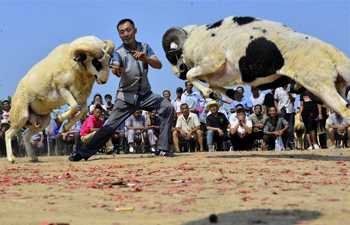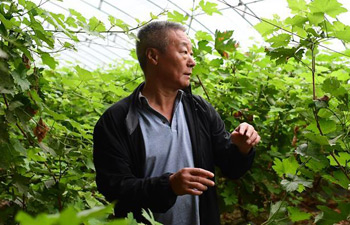by Peter Mutai
NAIROBI, Sept. 12 (Xinhua) -- Kenya's fresh producer exporters on Tuesday launched a massive campaign aimed at exporting the east African country's horticulture products to more non-traditional markets, an official said on Tuesday.
Hosea Machuki, Chief Executive Officer of Fresh Produce Exporters Association of Kenya (FPEAK), said that the East African nation is now focusing on selling the produce to the Middle East, China, Japan, Australia and New Zealand.
"The diversification from the traditional markets has been necessitated by the demand of horticulture, vegetables and fruits in other parts of the world," Machuki told a press conference.
He said that Kenya has started production of vegetables and fruits that have higher standards, increasing variety and by shipping direct to the major supermarket chains.
In the past, Kenya has relied on foreign exchange earnings from tea, remittances from Kenyans living abroad and tourism while horticulture sub-sector has faced myriad challenges.
During the period, the EU raised issues over excess pesticides and quarantine pests leading to the new development.
"We have secured good market in European Union (EU) and will also start exporting our produce to the United States of America next year," he added.
He said that the American market is ready for Kenya's produce, and with the launching of direct flights to Washington, Kenya will explore this market after training growers and exporters on the necessary requirements.
Machuki disclosed that Kenya is now set to consolidate its international markets.
"We have spent the last five years developing systems to ensure that the challenges of excess pesticides and presence of quarantine pests does not haunt the industry again," he said.
Machuki revealed that Kenya earned about 1 billion U.S. dollars last year from fruits, vegetables and spices sub sector and plans to increasing the earnings this year.
He said that a recent survey by FPEAK revealed that Kenya has increased production of edible horticulture production in the last 20 years.
The production increased to 7.6 million tonnes annually from 589,939 hectares that earned the country 1.3 billion dollars.
Machuki however said that Kenya's production system suffers from supply-side constraints related to low productivity as there is neither the surplus of marketable products nor the production capacity to take immediate advantage of new trade opportunities.
He observed that monitoring of pesticide residues, microbiological load and heavy metal contaminants for produce consumed in the domestic market are not closely monitored and contaminant tests are rarely carried out.
"We need a substantial investment and technical assistance in order to expand the production, reduce post-harvest losses and improve food safety," Machuki added.
Kenya produces Irish potatoes, tomatoes, cabbages, snow peas, kales, spinach, runner beans, French beans, carrots, broccoli, indigenous vegetables, and Asian vegetables for the international market.

















